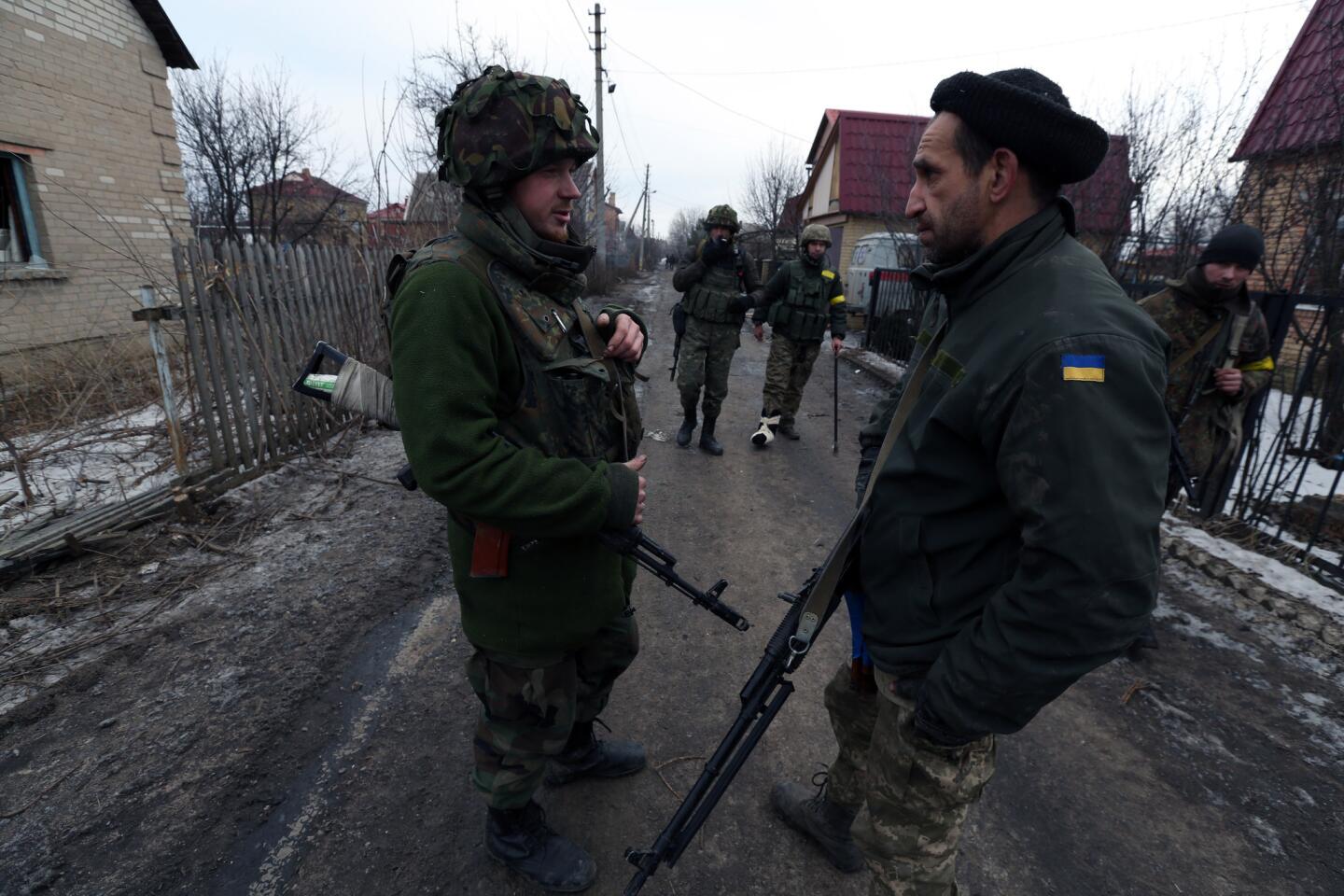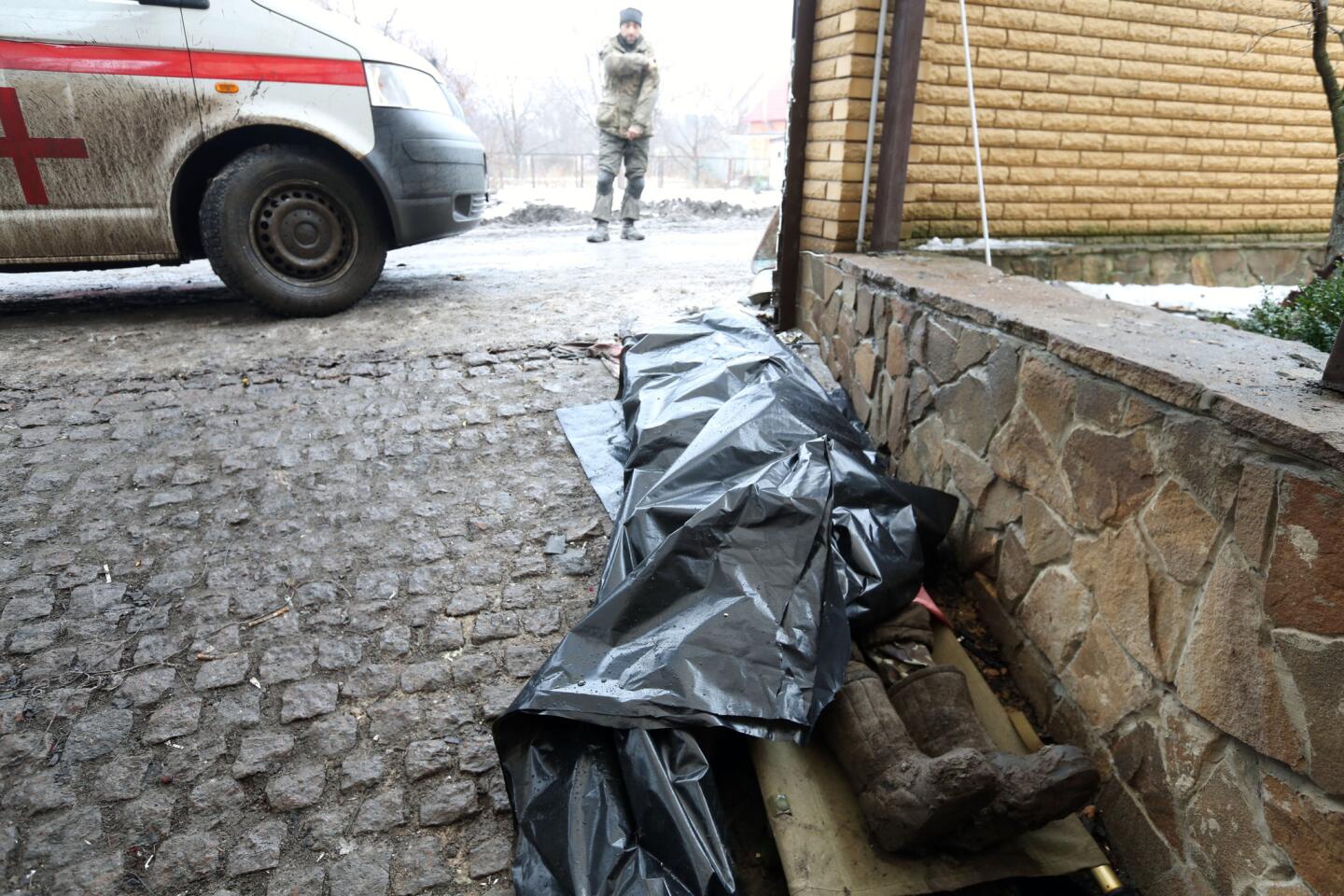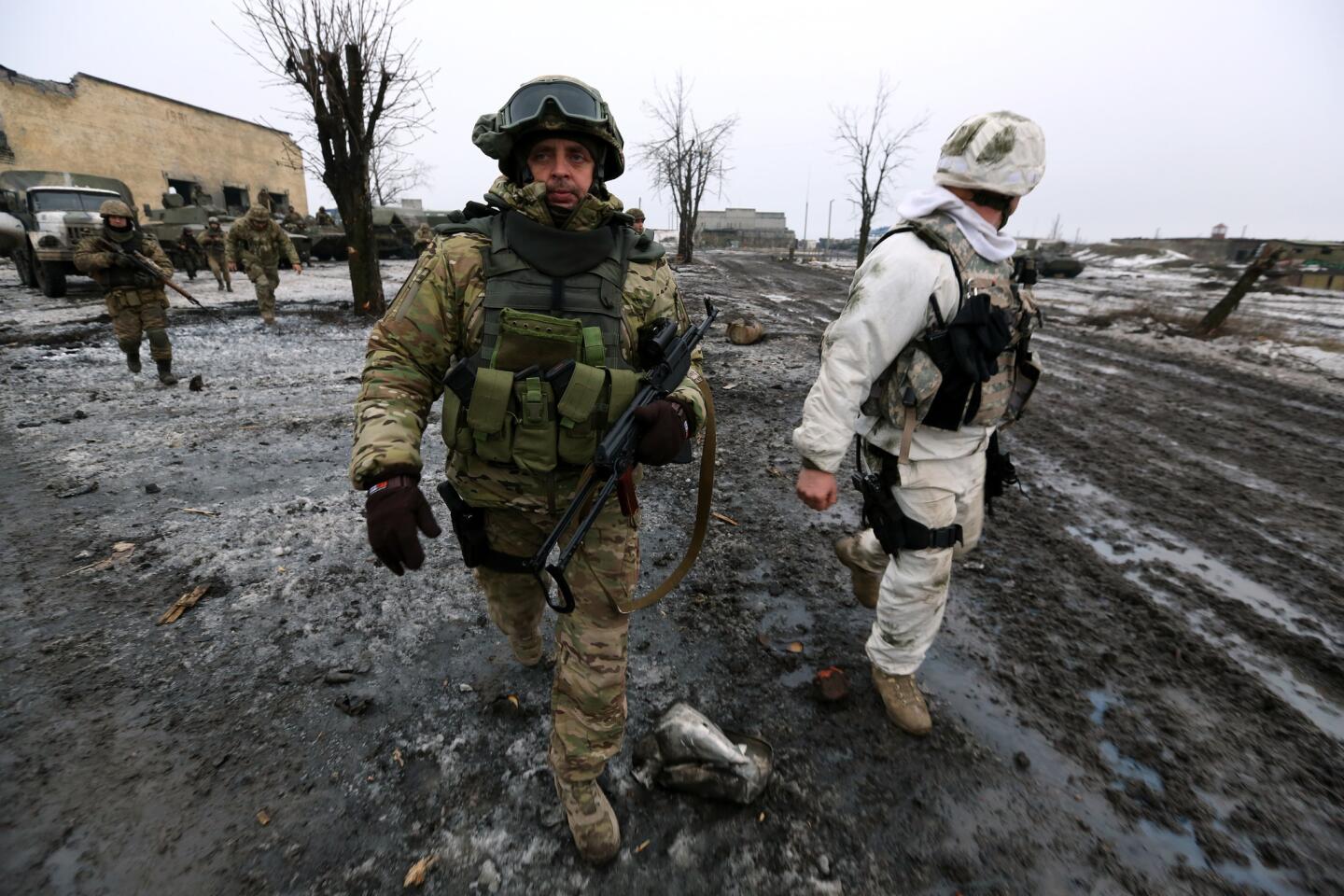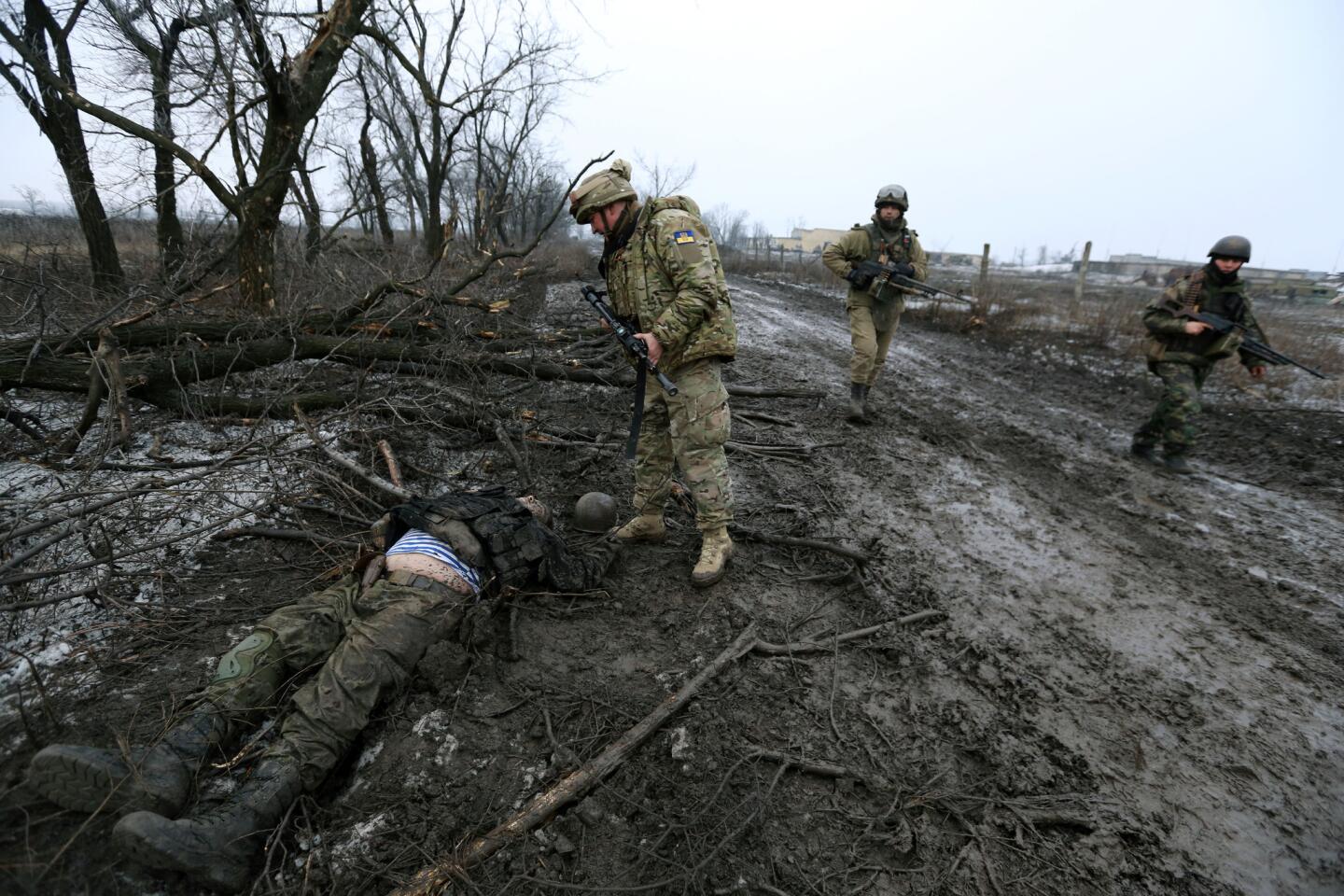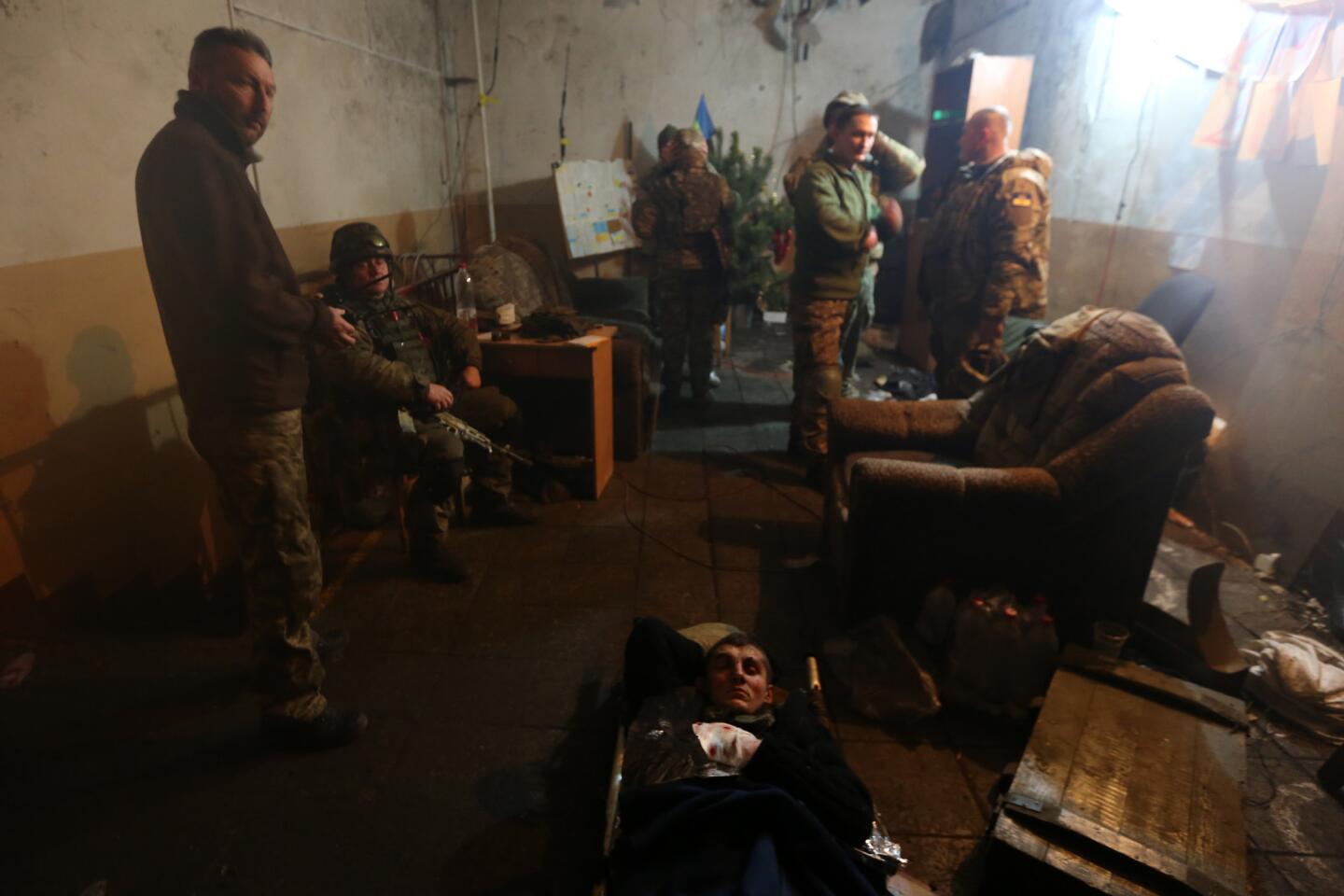Great Read: How Ukraine’s outgunned ‘cyborgs’ lost Donetsk airport
- Share via
Reporting from Donetsk, Ukraine — The Ukrainian platoon commander sat in a burned-out armored vehicle on the edge of the Donetsk airport runway with the body of his comrade in the driver’s seat next to him. He could hear the separatist fighters who had killed the man just yards away in the thick fog.
Only a few days earlier, Maxim Bugel, a former cellphone company manager, had sat at the base with his friend, drinking tea and laughing at his jokes. They had shared memories of the peaceful life they once had. Now Bugel was trying to extract the man’s charred body from the blackened hulk to return it home for proper burial.
The driver and the four others in the vehicle had died in the final days of the siege of the Donetsk airport, whose once-glass-walled new terminal building became a doomed “little Stalingrad” for its outgunned Ukrainian defenders.
For 242 days, they had held out against pro-Russia separatists who bombarded them from beyond the runways and prowled above and below them in the wreckage of the terminal. Finally, last week, the surviving Ukrainian soldiers fled. The battle had been lost.
I was surrounded by comrades all of whom were dead and by enemies very much alive.
— Maxim Bugel, platoon commander
Bugel heard laughter and loud voices at the top of the skeletal control tower. He peered out of the armored vehicle and saw a couple of “separs” hoisting the black, blue and red flag of Donetsk’s self-proclaimed republic. One man held a video camera and another a microphone, interviewing jubilant fighters about their victory.
His heart pounded as four of his soldiers carried the first two bodies back to their truck, a 10-minute walk through a nightmarish landscape of war debris and filthy snow.
Exhausted, he sat for a while with his friend. It was freezing; he could see his breath. Then, straining with the weight, he pushed the dead driver out onto the ground.
“It was like visiting hell,” the lanky officer, looking younger than his 32 years in his ill-fitting uniform, recalled from a heavily damaged dacha compound on the outskirts of Donetsk. “I was surrounded by comrades, all of whom were dead, and by enemies very much alive.”
::
When Bugel’s soldiers returned, they momentarily debated whether to shoot at the men in the tower. But they decided against it, given that some appeared to be journalists, even if they were Russian.
Instead, they left in silence with the corpses of their fallen comrades. Bugel carried one of them on his back.
“The driver is identifiable because he was in the driver’s seat and we know his name,” Bugel said. “One man still had a Kalashnikov in his arm and we could identify him by the weapon’s number. The other three will be taken to a lab for identification.”
All the men were with the same airborne brigade that was the last to defend the terminal, a battle that had left dozens dead and hundreds wounded.
But in recent days, after several broken truces, separatists tightened a noose around the terminal, bombarding it day and night.
“They drove up two tanks right in front of the terminal and shot it point-blank a few times and went away before our artillery could get them, and they would do it again and again, completely turning the terminal into a sieve,” brigade commander Col. Yevgeny Moysyuk said with a deep sigh.
“We couldn’t get our tanks or armored vehicles there anymore because they had used the truce time to fortify all the side approaches and deploy all kinds of heavy weapons.”
In the end, all his brigade’s armored vehicles were destroyed or damaged and 62 men were unaccounted for. At least 13 were dead, including the five in the vehicle. The rest, he said, had been taken prisoner, or worse.
Moysyuk’s eyes were full of fury as he insisted that the enemy included Russian regular troops, even though Moscow has denied being directly involved in the fight.
“The language they spoke, the accents, the jargon, the vocabulary — all was Russian Russian, not even Ukrainian Russian,” he said bitterly, recalling their intercepted radio communications as he sat in a darkened basement in the dacha compound. “They were professionals, no question about it.”
As he spoke, a Grad missile struck the roof of a neighboring house, a direct hit, a duty officer reported.
“The professionals,” he said, had driven the terminal’s defenders from the ground floor to the second floor, then climbed up into the third floor, laid explosives and blew up the ceiling and the base of the second floor. Most of about 50 Ukrainian paratroopers there were wounded or killed, he said.
::
Ukrainian journalists and politicians like to call Donetsk’s defenders “cyborgs,” death-defying symbols of popular resistance to what many in Ukraine see as a Russian invasion.
“The cyborgs withstood the final attack; the concrete didn’t,” said a battalion commander for another brigade with the code name Mike, whose units successfully defended the airport’s two terminals for most of October and November.
Moysyuk complained that his men had “kind of had fallen hostage to this beautiful cyborg legend,” trying to live up to the myth when it was already impossible to defend a collapsing building that finally fell on their heads.
“We should have evacuated our men a few days earlier, then waited for the separs to converge on the premises and bury them under the ruins,” he said. “But in war it is your will against his will, and your smarts against his, and they buried us instead.”
He recalled the final days of the siege.
At one point, in a desperate bid to rescue his men, Moysyuk borrowed a couple of armored vehicles with drivers from another brigade. But the drivers refused to go into what they knew was a fiery hell.
So Moysyuk’s own officers drove into the fog that had descended on the tarmac. Misled by the fog, they arrived at a different building, where they were surrounded by the enemy.
“They were greatly outnumbered, they used all the ammo, and then there was a hand-to-hand fight. Some were killed; some were subdued and taken POW,” Moysyuk said.
The next day, the remaining paratroopers were ordered to attack the airport head-on.
“This is just sheer idiocy!” exclaimed an airborne battalion commander, Maj. Ruslan Prusov. “We are not infantry; we are paratroops. We need some armor to travel on into battle. We don’t have it.
“To really storm the airport and win it back, we need 10,000 men, tanks and armored vehicles, but first of all one or two hours of serious artillery or missile bombardments,” Prusov said. “But best of all, attacks by combat jets or tactical missiles.”
Prusov’s battalion had been on the march for more than 24 hours to get to the airport. The troops arrived exhausted at 6 a.m. Jan. 20, without having had a proper meal or rest. With just 14 armored vehicles and 124 men, they were ordered to carry out yet another rescue mission at 8 a.m.
“I lost two men dead, seven wounded and seven vehicles before even reaching the tarmac,” said Prusov, who now camps out with his men in the damaged but still lavish mansion of a former Soviet KGB general — minus water, electricity and heating — on the outskirts of Donetsk.
“When those who made it got there, they were almost shot at by the defenders who couldn’t believe they were being rescued and at first took them for enemies in the fog.”
::
The man in charge of the operation, Col. Gen. Viktor Muzhenko, Ukraine’s military chief of staff, was not inclined to share the pessimism of his subordinates.
Muzhenko wore a regular soldier’s uniform and carried a Kalashnikov in his hands near the airport in full daylight. When artillery rounds exploded about 50 yards away, he refused to acknowledge them or accelerate his pace.
“A war doesn’t proceed without casualties,” Muzhenko said. “The losses of the opposite side are far greater than ours, and we didn’t lose the airport, as it just became the front line, that is all.
“Everything was done properly and on time, and the battle in which the airport is just a small element is far from being over,” he said. “You just wait and see.”
About a mile away, a doctor examined a large, bleeding wound on the top of a soldier’s head. The man said he felt dizzy and the doctor asked him to wait so that he could put some stitches and bandages on it.
“Don’t you think he should go to a hospital?” another soldier asked.
The doctor laughed. “If we send everyone with such wounds to a hospital,” he said, “we will run out of men to fight the war with.”
More to Read
Sign up for Essential California
The most important California stories and recommendations in your inbox every morning.
You may occasionally receive promotional content from the Los Angeles Times.
